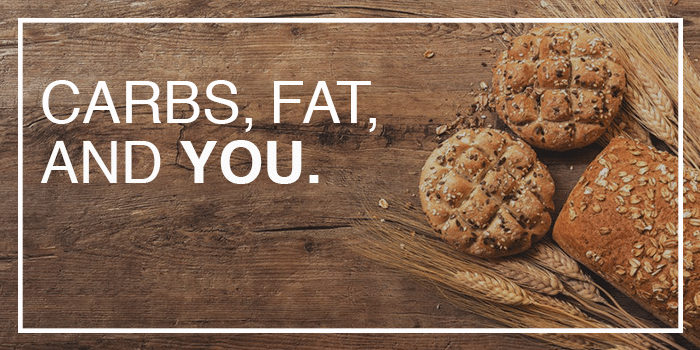 5-star Fitness
5-star Fitness
 5-star Fitness
5-star Fitness

Carbohydrates, fat, and you… are carbs really to blame for weight gain and increased body fat? While some popular diets may want you to believe carbs are your worst enemy we’re here to clear the air! First of all, get excited… carbs are good for you and you should be eating them! Second of all, carbs do not make you fat… overconsumption of carbs (or any macronutrient) can trigger your body to store fat, and there’s a simple way to fix this: get your portion sizes under control!
When no-carb and low-carb diets, such as the Atkins diet, hit the nutrition trend in the 90s early 2000s, the widespread belief became that carbs were the enemy and responsible for individuals packing on the pounds. People cut out candies, crackers, cookies and cake along with whole grains, legumes, and fruit. Carbs were then swapped for heavy cream, bacon, and broccoli. Yes, people lost weight initially… but just like any other diet, many people gained it right back (and then some) when they eventually resumed their normal eating habits. Why? Because a diet eventually comes to an end as “diets” are traditionally not sustainable for long periods of time. What I want you to learn about carbs is that they are not all created equal; the type of carbohydrate and the amount you consume is what is most important. Also- carbs are ESSENTIAL for a healthy body!
The Basics: When carbohydrates are digested they are broken down into glucose (sugar). This glucose is taken into the bloodstream (think of it as an internal highway, the transportation system of the body!) which we measure as blood sugar (the amount of glucose in the bloodstream at one time). Insulin is the ‘taxi driver’ that picks up glucose and delivers it to the cell to use as fuel. When there is too much fuel for the cell, the extra glucose is stored for later… these storage units are called fat cells.
We have two categories of carbs; simple and complex. Simple carbohydrates are broken down very simply, hence the name. This simple breakdown causes blood sugar levels to increase very quickly, overloading the cells and creating the need for more storage. More storage means more fat cells, resulting in weight gain. Complex carbs are complex to breakdown, meaning they take lots more time to become suitable for transportation through the bloodstream. This complex breakdown helps release the glucose at a slower pace, therefore providing a steady stream of glucose rather than a spike. This slow and steady stream of glucose is our bodies preferred way of using glucose, and it diminishes the need to create fat cells.
Complex carbohydrates come in the form of whole grains, beans/legumes, and vegetables, with the exception of starchy vegetables: potatoes, peas, corn, and winter squashes which can be processed more simply. Simple carbohydrates come in the form of table sugar, used in baked goods, candies, refined foods, some sauces, dressings and milk sugar (lactose). Refined whole grains can also be simple as well, the more processing of the food before you eat it, the less complex the food is to digest, therefore the faster it hits the bloodstream. This means the more unprocessed, true-to-nature foods you eat, the better!
Fiber is also a carbohydrate and an extremely important carbohydrate at that! Fiber is actually not broken down into glucose. Instead, it attaches to cholesterol in the bloodstream and helps help your body to excrete them, making fiber a heart-healthy food. When looking at a nutrition label, subtract the amount of fiber from the total grams of carbohydrates and you will get your net carbs. This is the number to use when calculating your carbohydrates. Next, look at the amount of sugar (your simple carbohydrates). The American Heart Association recommends no more than 25 grams PER DAY for women and 37.5 grams PER DAY for men.
The portion size of the carbohydrate is also important. We don’t want to consume more than we burn, otherwise, fat storage occurs. In terms of grams, we only need about 30-45 grams of carbs per meal and approximately 15 grams per snack. In terms of portion control, limit your serving of carbs to 1/2 cup per serving. If your physical activity is increasing, your need for carbohydrates may increase.
Conclusion: Carbohydrates do not make you fat, but if you consume more than you are going to use, yes – you will store the excess as fat cells.
Applying the Lesson: When creating your balanced plate, make 1/4 of your plate carbohydrates coming from whole grains, beans/legumes, starchy vegetables, and fruit. Limit simple carbohydrates. If you over consume them, make time to burn them with a walk or other physical activities!